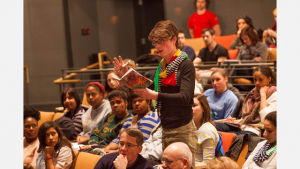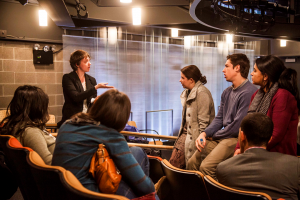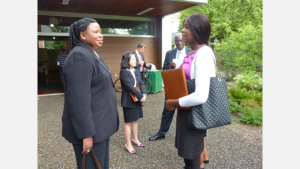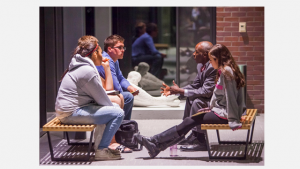We spoke to Brian M. Harward, Robert G. Seddig Chair in Political Science and Director of Allegheny College’s Center for Political Participation, about the engagement efforts of the Center and recommendations for those interested in creating a civic engagement center or institute on their campus.




Does your center play a role on campus in educating students to be civically engaged, politically engaged or both?
Both
How so?
Though we are a “center,” we operate on a model of diffusion–building bridges across divisions, departments, and programs of the College. That means that in everything we do, we attempt to cultivate participation broadly. Civic inquiry emerges from multiple disciplinary perspectives and many meaningful civic learning opportunities obviously happen outside of the work of a center. So we do a lot of collaborative projects on civic and political engagement, but our historical practice has been to take primary responsibility for cultivating opportunities for student political participation–through seminars, workshops, research, lectures, conferences, performances, organizing, direct action, and so on.
In what ways does your center support faculty interested in teaching students to be civically engaged (volunteering in the community for example)?
We have faculty fellows who collaborate on our projects, offer courses through our programs, and participate in and lead our research activities. We also run curricular programs and short courses that rely on faculty.
In what ways does your center support faculty interested in teaching students to be politically engaged (such as administering voter registration drives)?
Our faculty fellows tend to do this with some of their classes, though it is typically limited to those classes where such activities are part of the focus of the inquiry (i.e., direct action organizing; problems of democracy; and community and justice studies).
What advice might you offer to faculty and administrators interested in creating a center or institute of civic engagement on their campus?
First, I would urge them to consider a model of diffusion such as we’ve developed through our Law & Policy Program (see below)–to place their activities at the center of the institution rather than in a center at the institution. Second: I would also encourage them to attend to programs that cultivate both dimensions of civic learning: civic engagement *as well as* civic knowledge. Surely, service learning and other civic engagement opportunities are exciting and often deeply powerful experiences for students as they link their academic interests with the communities of which they are a part. But civic learning can also reflect course and program emphases on civic mindfulness, civic judgment, civic knowledge, and social responsibility—without a community engagement dimension. I would encourage us to be pluralistic in our approaches, as there are many ways—through civic engagement and the cultivation of civic mindfulness—faculty and professional staff can provide opportunities for heightening student civic learning.
Are there any programs or initiatives that you’d like to highlight? Tell us about them here.
We have several programs that might be of interest to other institutions, but one might be of particular interest: the Law & Policy Program. Law & Policy is a program that blends students’ academic goals and preparation in international and domestic law and policy with on-going opportunities in career education, internships, study away, civic learning, and community programming.
The Program in Law & Policy provides opportunities for students to explore law and policy from theory to practice. Through integrated courses and collaborative learning experiences including campus and community workshops, lectures, and internship opportunities, students engage public policy and learn how policies emerge, are implemented, evaluated, and changed. In collaboration with the Center for Political Participation (CPP) and academic departments from across the College, the Law & Policy Program integrates students’ academic coursework with issues, activities, and opportunities for pre-professional development in areas of great public importance.
Key Elements: We have layered onto the program a series of short courses (one per semester for 1-2 weeks) on themes connected to domestic and international law and policy with local, national, and international scholars and practitioners in residence. In the past year, we’ve offered two such courses: one on the politics of the federal budget led by a former Office of Management and Budget officer; and another on criminal law and sentencing decisions, led by a local judge. By structuring co-curricular experiences in connection to currently-existing courses and the short courses, we will be able to capture much of what students and faculty value about collaborative and integrative learning opportunities
We have identified several thematic tracks for the program including, but not limited to, the following: Poverty and Inequality; Journalism and Democracy; Energy Policy; Courts and Social Change; International Criminal Law; and Citizens and Science
Students apply for acceptance into the Program; and progress toward the Concentration is tracked by the Center for Political Participation student and faculty staff members in collaboration with the Pre-Law Advisors.
Center for Political Participation Student Fellows are the peer leaders for the Program, with faculty and staff advisers providing oversight and record-keeping of students’ successful completion of the Program.
Students accrue points, akin to Continuing Legal Education credits (i.e., enrolled students must accumulate and document 120 “points” toward their L&P Concentration).
Students in the Law and Policy Program develop portfolios that serve to document their progress in the Program (learning objectives and portfolio prompts can be made available, if readers are interested). For example, complete portfolios include such items as personal statements for law school and grad school applications, academic awards, reflection essays on workshops, independent research, study away, civic engagement courses and programs, coursework, senior theses, and other items that reflect their developing interests in law and policy.
Completed portfolios are submitted in early April of the graduating student’s senior year to a review committee (CPP staff, Pre-Law Advisor, and a departmental representative). At that point, an exit interview is scheduled, the portfolio is evaluated, and the Concentration in Law & Policy is granted.
The Program works with the CPP, National Fellowship Advising, Study Away, and Pre-Law Advising to more deliberately connect those resources and advise students. In particular, the Program has already reinvigorated Pre-Law Advising and has developed important capacity in Pre-MPA, and MPP Advising—something we’ve not had as a priority previously, though many students have interest in those areas as well.
For more information:
Center for Political Participation
Robert H. Jackson Center Partnership